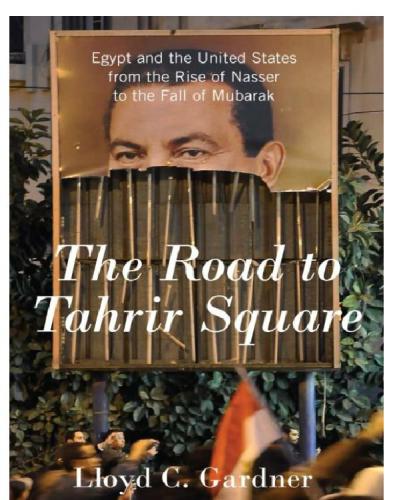
The Road to Tahrir Square
Egypt and the United States from the Rise of Nasser to the Fall of Mubarak
فرمت کتاب
ebook
تاریخ انتشار
2011
نویسنده
Ray Romanoنویسنده
Mark Driscollنویسنده
Lloyd Gardnerناشر
The New Pressشابک
9781595587510
کتاب های مرتبط
- اطلاعات
- نقد و بررسی
- دیدگاه کاربران
نقد و بررسی

August 22, 2011
Gardner, professor of history at Rutgers (The Long Road to Baghdad), chronicles the U.S. and Egypt’s 20th-century entanglements with concision and clarity. After WWII and the retreat of British colonial influence in the Middle East, American diplomats identified Egypt as a crucial partner in the region. Administration after administration operated from the basic policy principle that “a strong Egypt meant a strong Middle East.” Using the “carrot and stick” approach, the U.S. provided economic aid, military support, and CIA interference to promote stability and pliability in the Egyptian government, while largely ignoring the regime’s repression of the Egyptian people. In workmanlike prose, Gardner describes the U.S.’s involvement in the negotiations over the fragile peace between Egypt and Israel, and tells of Egypt’s role in the “war on terror.” Pointing out the essential contradiction of our promoting a democratic Iraq while supporting Mubarak’s repressive regime, Gardner concludes that the popular revolutions of the Arab spring are the only logical outcome of decades of American doublespeak. The book is a thought-provoking distillation of the convoluted dealings between diplomats and governments that calls for a new tack, in which American actions finally match our rhetoric.

September 1, 2011
Solid account of Egypt's still-developing political transformation and how it has related to the United States.
Gardner (History/Rutgers Univ.; The Long Road to Baghdad: A History of U.S. Foreign Policy from the 1970s to the Present, 2010, etc.) has written extensively on the history of the Middle East, especially the time since World War II. Here he brings that experience to bear on the recent developments in Egypt and elsewhere in the region—a series of uprisings dubbed the "Arab Spring." The author examines the international exigencies that have bound proponents of national independence and self-determination in the aftermath of the war, and he situates the downfall of Hosni Mubarak in the context of the paradoxes that American policies placed on the country since the end of the war. Gardner addresses many historical and political threads, including the consequences of the collapse of the British Empire and its replacement by the U.S., which had different priorities during the Cold War, when promotion of radical Islam as a movement against communism was affected also by the need to cooperate with the British over military bases and strategy. For Egypt, this translated into a choice between leading the Arab world, or simply remaining a somewhat inconsequential Nile River Valley country. The author also looks at deeper concerns regarding the transformation of a region whose politics have been based, especially since 1947, on three differing and conflicted allies of the U.S.: Israel, Saudi Arabia and Egypt.
Gardner ably pursues strategy and context as sources of political constraint and tension, providing a useful overview of Egypt's dealings with the U.S. Pair with Steven A. Cook's The Struggle for Egypt (2011), which provides greater detail on the variegated inputs at the local level.
(COPYRIGHT (2011) KIRKUS REVIEWS/NIELSEN BUSINESS MEDIA, INC. ALL RIGHTS RESERVED.)

September 1, 2011
Gardner (history, Rutgers Univ.; The Long Road to Baghdad) is a well-known authority on the Middle East. His narrative here portrays Egypt as an essential actor in the region over the past 70 years, taking leading roles at the end of the British Mandate in Palestine and creation of Israel, as well as in several regional conflicts. While the United States was trying to define a new international role for itself at the end of World War II and into the Cold War, it was juggling the existing tensions and rivalries around Egypt. Successive U.S. administrations plied successive Egyptian rulers with both economic and military assistance, trying to develop a stable ally. The recently deposed leader Hosni Mubarak provided that stability for 30 years. VERDICT Gardner's coverage is more in-depth for the earlier years of his focus, i.e., under President Nasser, and, in spite of the title's implication, lighter for the past 15 years, but many titles on U.S.-Egypt relations cover relatively shorter periods (even William J. Burns's Economic Aid and American Policy Toward Egypt, 1955-1981, which is considered relatively comprehensive). Informed readers will find this useful background to current headlines on a topic likely to persist well into the future.--Marcia L. Sprules, Council on Foreign Relations Lib., New York
Copyright 2011 Library Journal, LLC Used with permission.

October 1, 2011
Even as the world continues to process the ripples throughout the Middle East since Egyptian protesters took to Tahrir Square in January 2011 to oust Hosni Mubarak, Gardner offers a long perspective on how Egypt came to its current, critical stage. Drawing on historical records and the more recent WikiLeaks archives, he details the complex history of U.S. relations with the Middle East and Egypt, in particular. U.S. resistance to facing up to the regimes of Mubarak and others caused blindness to the reality of strong, simmering hostilities that could not be denied. Gardner details the delicate process of managing post-British colonial relationships in the Middle East, from King Farouk to Gamal Abdel Nasser to Anwar Sadat, which eventually posed Egypt as a stabilizing force in the region while the U.S. sought to help establish and protect Israel and the forces that are now challenging the old order. An interesting look at the changes in U.S. relations with Egypt during the past six decades and where those relations may be headed in the course of the Arab Spring.(Reprinted with permission of Booklist, copyright 2011, American Library Association.)

























دیدگاه کاربران